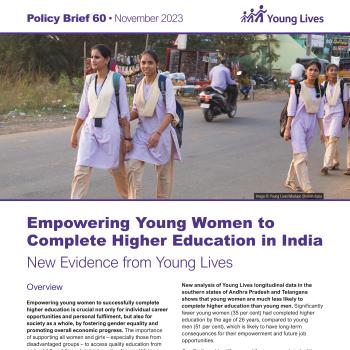
India has seen a huge increase in higher education enrolment in recent years. But Young Lives data shows that young women are much less likely to complete higher education than young men. Significant gender inequalities in graduation rates persist and particularly affect young women from poor households and socially disadvantaged groups, which is likely to have long-term consequences for their empowerment and future job opportunities.
The authors identify a number of factors that disproportionately affect girls' ability to complete higher education including poverty and caste. Their analysis of Young Lives longitudinal data also shows that early foundational skills and other individual factors predict later success: girls with poor reading skills at age 8 and low maths and vocabulary test scores at age 12 are significantly less likely to gain a degree through higher education, as are those who engage in paid and domestic work at age 12.
The Policy Brief argues that provision of a supportive and enabling environment for all girls and young women to stay in education with sufficient resources and time to study is key to enabling them to complete higher education. Without it, investment in higher education will be much less successful in supporting girls to succeed.
The evidence in this policy brief is drawn from a range of Young Lives publications over the last two decades, including our new research report, ‘Exploring Factors Affecting Gender Inequality in the Completion of Higher Education in India: A Survival Model Analysis’ (Singh, Mukherjee and Kumar 2023).
You can find more information on Young Lives research into education and skills development through childhood here and follow Young Lives on social media: Twitter/X - @yloxford, Facebook and LinkedIn.

India has seen a huge increase in higher education enrolment in recent years. But Young Lives data shows that young women are much less likely to complete higher education than young men. Significant gender inequalities in graduation rates persist and particularly affect young women from poor households and socially disadvantaged groups, which is likely to have long-term consequences for their empowerment and future job opportunities.
The authors identify a number of factors that disproportionately affect girls' ability to complete higher education including poverty and caste. Their analysis of Young Lives longitudinal data also shows that early foundational skills and other individual factors predict later success: girls with poor reading skills at age 8 and low maths and vocabulary test scores at age 12 are significantly less likely to gain a degree through higher education, as are those who engage in paid and domestic work at age 12.
The Policy Brief argues that provision of a supportive and enabling environment for all girls and young women to stay in education with sufficient resources and time to study is key to enabling them to complete higher education. Without it, investment in higher education will be much less successful in supporting girls to succeed.
The evidence in this policy brief is drawn from a range of Young Lives publications over the last two decades, including our new research report, ‘Exploring Factors Affecting Gender Inequality in the Completion of Higher Education in India: A Survival Model Analysis’ (Singh, Mukherjee and Kumar 2023).
You can find more information on Young Lives research into education and skills development through childhood here and follow Young Lives on social media: Twitter/X - @yloxford, Facebook and LinkedIn.

